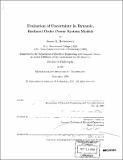Evaluation of uncertainty in dynamic, reduced-order power system models
Author(s)
Hockenberry, James Richard
DownloadFull printable version (11.67Mb)
Other Contributors
Massachusetts Institute of Technology. Dept. of Electrical Engineering and Computer Science.
Advisor
Bernard C. Lesieutre.
Terms of use
Metadata
Show full item recordAbstract
With the advent of high-speed computation and the desire to analyze increasingly complex behavior in power systems, simulation techniques are gaining importance and prevalence. However, while simulations of large, interconnected power systems are feasible, they remain time-consuming. Additionally, the models and parameters used in simulations are uncertain, due to measurement uncertainty, the need to approximate complex behavior with low-order models and the inherent changing nature of the power system. This thesis explores the use of model reduction techniques to enable the study of uncertainty in large-scale power system models. The main goal of this thesis is to demonstrate that uncertainty analyses of transient simulations of large, interconnected power systems are possible. To achieve this, we demonstrate that a basic three stage approach to the problem yields useful results without significantly increasing the computational burden. The first stage is to reduce the order of the original power system model, which reduces simulation times and allows the system to be simulated multiple times in a reasonable time-frame. Second, the mechanics of the model reduction are closely studied; how uncertainties affect the reduction process and the parameters in the reduced-order model as well as how the process of reduction increases uncertainty are of particular interest. Third, the reduced-order model and its accompanying uncertainty description are used to study the uncertainty of the original model. Our demonstration uses a particular model reduction technique, synchronic modal equivalencing (SME), and a particular uncertainty analysis method, the probabilistic collocation method (PCM). Though our ideas are applicable more generally, a concrete demonstration of the principle is instructive and necessary. Further, while these particular techniques are not relevant to every system, they do apply to a broad class of systems and illustrate the salient features of our methodology. As mentioned above, a detailed analysis of the model reduction technique, in this case SME, is necessary. As an ancillary benefit of the thesis work, interesting theoretical results relevant to the SME algorithm, which is still under development, are derived.
Description
Thesis (Ph.D.)--Massachusetts Institute of Technology, Dept. of Electrical Engineering and Computer Science, 2000. Includes bibliographical references (leaves 209-213).
Date issued
2000Department
Massachusetts Institute of Technology. Department of Electrical Engineering and Computer SciencePublisher
Massachusetts Institute of Technology
Keywords
Electrical Engineering and Computer Science.